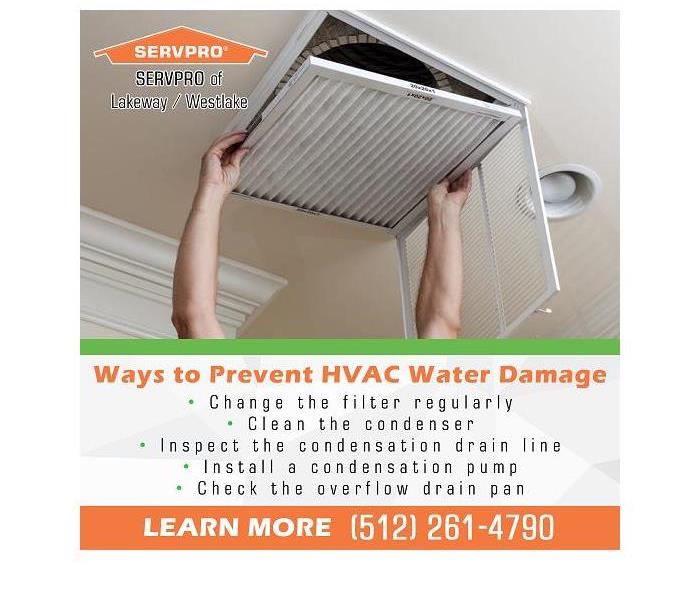SERVPRO of Westlake/Lakeway suggests several steps to maintain HVAC systems to prevent any water damage
7/19/2021 (Permalink)
Blog summary: SERVPRO recommends several maintenance tips for HVAC systems that can help prevent any water damage.
Ways to prevent HVAC Water Damage
The Heating, Ventilation, and Air Conditioning (HVAC) system that is not maintained has the potential to cause extensive water damage to homes and businesses. The usual suspects are clogged drains, frozen evaporator coils, and pipes that are not connected correctly. SERVPRO recommends various ways to maintain HVAC systems and prolong their lifespan, and avoid any possible water damage:
- Change the filter regularly
- What is the job of a filter? It filters dust, pollen, pet dander, and other small particles out of the air so that the inhabitants can breathe. These particles are trapped in the filter, preventing them from recirculating throughout the property.
- Type of filter: Check the instructions manual and understand what type of filter is needed.
- Prevent overwork: A new filter prevents the unit from overworking, which can cause freezing and then defrosting on the evaporator coils.
- HEPA filters: Changing the high-efficiency particulate air (HEPA) filters once a month is ideal. The frequency of changing the filters depends on the type of filter and the frequency of use.
- Professional help: If the filters are inside a furnace or air handler, it is a wise idea to hire a contractor to change the filters.
- Clean the condenser
- What is a condenser? The condenser is the exterior portion of the air conditioner or heat pump that functions efficiently in the presence of proper airflow.
- Clean it: Remove any dirt or other debris accumulating on the condenser once a year.
- Maintain distance: Keep a distance of at least two feet between the unit and plants in the yard.
- Inspect the condensation drain line
- What’s a condensate line? Its job is to keep moisture from building up inside the home and, specifically, inside the HVAC unit.
- Check the flow: While the AC runs, ensure that the water is flowing to the drain from the condensation line opening.
- Clean the drainage holes: Use a paper clip or wire to clear the drainage hole on the base of the cabinet (beneath the evaporator fins). The condensation line needs to be cleaned every three to six months.
- Flush the line: Once or twice a year, use an algaecide, a commercial solution, or regular bleach to prevent the formation of mold or algae.
- Pipe orientation: Check that the pipe is oriented correctly, especially after a rocky weather incident.
- Shut-off valve: Instal an overflow shut-off device on the drain line to automatically turn off the A/C unit in case the drain line backs up.
- Install a condensation pump
- What’s a condensation pump? A condensation pump is a specific type of pump used to pump the condensate (water) produced in an HVAC (heating or cooling), refrigeration, condensing boiler furnace, or steam system.
- Dispose of excess water: This pump helps excess water flow into the proper disposal drain.
- Safety float switch: Instal a safety float switch to automatically shut down the power to the AC unit when condensation builds up. This prevents the risk of water overflow.
- Check the overflow drain pan
- What is a drain pan? It collects any water that has overflowed due to a clogged drain line. Over time, the metal or plastic in these pans may get damaged, resulting in leaks and water damage.
- Check for leaks: Patch up small holes or cracks using epoxy glue or replacing the pan entirely.
- Regularly clean: Rinse the pan with a bleach-water mixture to get rid of any dirt or mold growth.
Most of these tasks are DIY, but there may be instances when professional help is needed to prevent damage. Other HVAC components such as ductwork, furnace flames, grills and registers, AC compressors, and the thermostat are not meant to be handled by amateurs. To prevent any water and mold damage, and prolong the life of the HVAC unit, owners must hire a professional restoration and cleaning company such as SERVPRO.
Why SERVPRO?
- SERVPRO uses state-of-the-art equipment to bring the damaged property back to its original state. SERVPRO of Lakeway / Westlake is always updating its fleet and equipment so clients in Lakeway, Westlake, or anywhere else can quickly access the services.
- With over 1,700 US and Canadian Franchise locations, SERVPRO is strategically positioned to respond faster to an emergency of any magnitude.
- The SERVPRO staff is highly trained in property damage restoration. They receive initial in-house training and constant skill up-gradation at the corporate training facility and also acquire the regular IICRC-industry certification.
For clean-up services in West Lake Hills, call SERVPRO of Lakeway / Westlake today at (512) 261-4790.

 24/7 Emergency Service
24/7 Emergency Service
